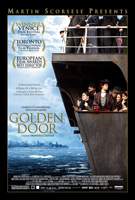- CELEBRITY
- 12:45 PM, Apr 25
The Golden Door Comments
- Home > Movie > G > The Golden Door > The Golden Door Ureview
-

- Genre : Drama
- Release Date : May 25, 2007
- MPAA Rating : PG-13
- Duration : 120 minute(s)
- Production Budget : -
- Studio : Miramax Films
- Official Site : http://www.goldendoor-movie.com/
- Reviews Rate :

- Readers Rate :


















Jun 26, 2007
'I lift my lamp beside the golden door': A Touching Tribute to Immigrants THE GOLDEN DOOR (NUOVOMONDO) is for this viewer the finest film of the year to date. It is a masterpiece of concept, writing, directing, acting and cinematography. More importantly, this radiantly beautiful film is a much needed reflective mirror for us to view the history of immigration of 'foreigners' into America at a time when the very mention of the word 'borders' is a political fuse. Writer/director Emanuele Crialese has given us not only a deeply moving story, he has also provided a touchstone for viewers to re-visit the history of each of our origins: with the exception of the Native Americans, we all entered America as 'foreigners' at some point in our histories, and it is humbling to view this film with that fact in mind.The film opens in turn of the century Sicily as poverty stricken widower Salvatore Mancuso (Vincenzo Amato) and his brother Angelo (Francesco Casisa) climb a rocky hill to present their tokens to the cross to ask for a sign as to whether they should continue to struggle for existence on the island or go to America, the land of dreams. Mancuso's deaf mute son Pietro (Filippo Pucillo) runs to the top of the hill with postcards he has found with images of America (money growing on trees, fruits and vegetables larger than people, rivers of milk in California, etc), and Salvatore accepts this as the sign that he should move his family to America. After convincing his reluctant mother Fortunata (Aurora Quattrocchi) and his sisters Rita (Federica De Cola) and Rosa (Isabella Ragonese) to make the trip, he sells his only possessions (two donkeys, goats, and rabbits) and the man with the boat arranges their trip, giving the family shoes, appropriate clothing, and instructions to board an ocean liner as third class passengers. As the Mancuso family prepares to board they are asked for a photograph, and as they pose behind a painted set, an Englishwoman Lucy/Luce (Charlotte Gainsbourg) walks into the photo as though she were part of this peasant family. Lucy cannot board the boat for America without male escort.The voyage begins and Luce in her gentle way identifies with the Mancuso family, finally solidifying her safe passage by proposing to Salvatore to marry her 'for convenience, not for love' when they arrive in America. Through a violent storm and living conditions that are appallingly poor, the multitude of third class passengers survive, bond, and eventually arrive at Ellis Island, believing their dream of America has been fulfilled. But everyone must pass harsh physical tests, de-lousing, and even intelligence testing to determine if they can enter America: the officials let them know that America does not want genetically inferior people entering the new world! Each woman must be selected by a man to marry on Ellis Island before she is allowed admission. The manner in which the Mancuso family remains united until a somewhat surprising ending is the closing of the tale.Few of us understand the strict rules and harsh treatment immigrants face (or at least faced at the turn of the century on Ellis Island), and if we do we have elected to submerge that information. THE GOLDEN DOOR presents the case for immigrants' struggles in a manner that not only touches our hearts but also challenges our acceptance of current immigration legislation. But all political issues aside, THE GOLDEN DOOR is first and foremost a film of enormous beauty, exquisite photography, deeply felt performances by a huge cast, and a very sensitively written and directed story. The use of cinematic fantasy moments (characters swimming in a river of milk, coins falling over half buried bodies, cartoon-like vegetables, etc) only enhances the message of dreams of those whose lives in other countries fell short of the miracles expected in America. Antonio Castrigano's musical score is fascinatingly creative, using folk songs, contemporary music, and old tunes from this country. This is a film that deserves wide distribution, a movie that is a must see for everyone. Highly recommended. Grady Harp
